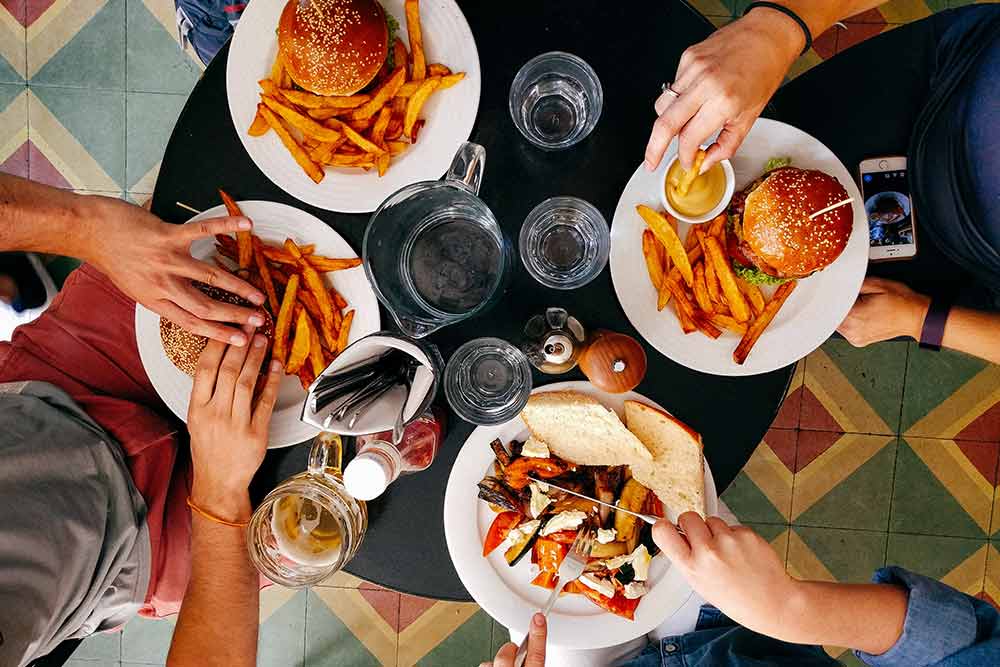Processed vs. Unprocessed Foods

Hunter Bennett
Over the last few years, we have seen a bit of a change in what many people would consider being a ‘healthy’ diet. This has revolved around moving away from bread, grains, and cereals, towards an increase in consumption of whole foods, such as meats, fruits, and vegetables.
With this has come a large debate around the differences between processed and unprocessed foods – a debate that seems to become more and more convoluted with every passing day.
Which is why we want to shed some light on the topic with today’s article!
What are processed and unprocessed foods?
To keep it as simple as possible, we can consider processed foods anything that has undergone some sort of processing prior to being sold. This essentially means that anything coming in a packet can be classified as a type of processed food.
Other examples include things like bread, pasta, spreads, cereals, sugar, and junk foods.
On the other hand, we have unprocessed foods (also known as whole-foods).
As their name so aptly suggest, unrepressed foods are foods that have not undergone (or very minimal) processing prior to being purchased. These foods include things like whole grains, meats, fish, fruits, and vegetables.
As a general rule of thumb, anything that came directly from the ground, or required oxygen to survive, can be classified as a type of unprocessed food.
Related Article: Anti-Inflammatory Foods in Your Diet (and What to Avoid)
The History Of Processed Foods
While some type food processing has been around for centuries (there is evidence to suggest that beer has been brewed since 7000 BC), the processed foods we are talking about are those mostly developed in the modern era.
Ultimately, we are talking about foods that are broadly classified as processed carbohydrates.
Throughout most of the 1800s our diet was still predominantly built around whole unprocessed foods. While grain consumption was increasing, we still ate mainly whole grains, and they still made up only a small portion of our diet – as did bread and pasta.
However, as we came to the end of the 1800s, breakfast cereal was slowly making its way into the regular Americans home.
Not only was this food tasty, but it was much more convenient than cooking eggs every single morning. Then combine this with the fact that cereal took much longer to expire than every other breakfast, and you had a recipe for success.
Or in this case, disaster (but more on that later).
Then the war came, and food becomes scarcer.
Bread And Porridge
Money was less plentiful, and meat and vegetables were less abundant. It was quickly realized that bread and porridge were much cheaper food alternatives, could feed more people, and could be stored longer than many whole foods.
They quickly became an integral part of the American diet – and since then, we have not looked back.
Over time these highly processed and carbohydrate-rich foods have been combined with both trans and saturated fats to create many of the modern foods we eat all too often today. Think of pastries, canned pasta, candy, and sweet drinks – all delicious, and all terrible for you.
While they are a far cry from the minimalistic processed carbs of the 1800s, they do share some similarities. They are still very cheap to make (and cheap to purchase), they last extremely well in your cupboard, and require next to no preparation to eat.
But, as I have already mentioned, they are not all that good for you – which leads us to our next point quite nicely…
Do processed foods impact weight?
The first thing I want to touch on here is on the topic of processed foods and obesity (Silva, 2018).
In short, there is a growing body of evidence to suggest that those individuals who consume more heavily processed foods tend to have more fat mass than those who do not. More importantly, this relationship appears to be what is known as dose-dependent.
This essentially means that the more processed foods you eat, the fatter you are going to be – with those individuals who eat the most heavily processed foods being much more likely to be classified as obese.
This is very likely to be the result of two distinct mechanisms:
- Firstly, highly processed foods tend to be much more energy dense than unprocessed foods. This means that per gram, they will contain more calories than whole foods (D’Avila, 2017).
- Secondly, highly processed foods are less satiating than whole foods. This means that they leave you feeling less full and less satisfied after eating them, which makes them much easier to overeat (Fardet, 2016).
It is this combination of factors that have the potential to lead to an increase in weight gain, and over time, obesity.
Processed foods and weight loss
Now, as you can imagine, eating a diet high in processed carbohydrates can also make it much more challenging to lose weight (Wright, 2017).
Because these foods are absolutely full of energy and are not very filling, they are very easy to overeat. This means that if you have a diet that is full to the brim with these heavily processed foods, your ability to lose weight will be limited.
So, if your goal is to lose weight, it is in your best interest to try and build your diet around whole unprocessed foods, and keep your processed food intake to a minimum.
Does processed food affect health?
Now, what about how processed foods affect health?
In conjunction with their effect on obesity, there is also a growing body of evidence to suggest that processed foods can have a rather serious impact on your health – and it all comes down to inflammation.
You see, when you eat carbohydrates, your blood glucose rises. Your body then secretes insulin to shuttle that glucose into your muscle tissue. However, if you are always eating these types of foods, then insulin secretion becomes constantly elevated (Hers, 1990).
Over time, your body will become resistant to insulin, which results in chronically elevated blood sugar levels. Then to make matters worse, your body will secrete more insulin to try and normalize your blood sugar levels.
This creates more insulin resistance – all of which results in you having permanently high levels of glucose and insulin in your blood.
And this is where things really take a downward spiral.
Not only is this a perfect storm for diabetes, but it can also contribute to an increase in weight gain by making it harder to use fat for energy. Moreover, it will also cause a huge increase in inflammation throughout the body (Smith, 2018).
This chronic inflammation physically damages the cells throughout your body, including those found in both your brain and your nervous system. Painfully, this actually limits their ability to function effectively.
A diet high in processed foods has been linked to:
- Cardiovascular disease (Bhardwaj, 2016)
- Diabetes and metabolic syndromes (Gross, 2004)
- Dementia and Alzheimer’s disease (Van de Rest, 2015)
- Depression and anxiety (Gangwisch, 2015).
In summary, a diet that involves too many processed foods can wreak havoc with every aspect of your health. In this manner, there are several diseases caused by processed foods that are completely avoidable if you choose to pay attention to your diet.
Do eating processed food at a young age affect health later in life?
As you could imagine, when we choose to look at the effect of processed foods on children’s health, the results are essentially replicated (O’Neil, 2014; Stanhope, 2016; Ferretti, 2017).
Children who eat too many highly processed carbohydrates are more likely to be obese, more likely to experience mental health problems, and are more likely to develop both cardiovascular and metabolic diseases (such as heart disease and diabetes).
But, to make matters worse, developing these diseases early in life can have a huge impact on their health during their adult life.
The research is very clear in stating that those children who develop health problems early in their childhood are much more likely to carry those problems into adulthood – and that the severity of those health problems will be much greater than if they were developed during adulthood.
In this manner, those children who eat poorly now are more likely to be obese, suffer from severe mental illness, and be diagnosed with severe chronic disease, as adults.
Related Article: The Effects of Exercising On a High Fat Diet
How to reverse the damage of processed food?
I have already stated that the problems caused by processed food come down to their ability to drive up inflammation.
Positively, this is reversible – and it’s all thanks to what we could describe as a “processed foods detox”.
What I mean by this is the process of excluding processed foods from your diet as a means to lower inflammation. In doing so, this can ultimately return your body to baseline, which can act as the catalyst for your improved health.
This can simply be accomplished by (NASEM, 2017):
- Choosing to eat a diet consisting entirely of vegetables, whole fruits, whole grains, low-fat dairy, and a variety of protein dense foods, including seafood, lean meats and poultry, eggs, legumes, as well as nuts, seeds.
- Excluding processed foods from your diet completely.

There is also some merit in making sure you include some anti-inflammatory foods (such as Turmeric, Berries, Seafood, and Green Tea) into your diet every single day (Gupta, 2013; Wall, 2010; Joseph, 2014; Ohishi, 2016):
Oh, and daily exercise is always a good thing.
Processed foods to avoid
Often excluding processed foods is easier said than done – which is why I wanted to give you a list of the worst processed foods, so you know what ones to avoid like the plague:
- Breads and pastries
- Pastas
- Junk food
- Fast food
- Candy
- Breakfast cereals
- Refined grains (such as quick cut oats and white rice)
- Soft drinks
- Fruit juices
If your goal is to return your body to baseline, lower inflammation, and reverse the damage of processed foods, then avoid these at all cost.
Take Home Message
While they are indeed cheap and convenient, there is a growing body of research clearly demonstrating that heavily processed foods can wreak havoc with both your physical and mental health.
Even worse is the fact that they can also set your child up for a lifetime of disease and illness.
So, try and make sure your diet is predominantly built around unprocessed whole foods, and reap the rewards associated. Trust me when I say you will thank us for it later.
References
Silva, Fernanda Marcelina, et al. “Consumption of ultra-processed food and obesity: cross-sectional results from the Brazilian Longitudinal Study of Adult Health (ELSA-Brasil). Cohort (2008–2010).” Public health nutrition 21.12 (2018): 2271-2279.
D’Avila, Helen Freitas, and Vanessa Ramos Kirsten. “Energy intake from ultra-processed foods among adolescents.” Revista Paulista de Pediatria 35.1 (2017): 54-60.
Fardet, Anthony. “Minimally processed foods are more satiating and less hyperglycemic than ultra-processed foods: a preliminary study with 98 ready-to-eat foods.” Food & function 7.5 (2016): 2338-2346.
Wright, N., et al. “The BROAD study: A randomised controlled trial using a whole food plant-based diet in the community for obesity, ischaemic heart disease or diabetes.” Nutrition & diabetes 7.3 (2017): e256.
Smith, John K. “Exercise, obesity and CNS control of metabolic homeostasis: a review.” Frontiers in physiology 9 (2018).
Hers, H-G. “Mechanisms of blood glucose homeostasis.” Journal of inherited metabolic disease 13.4 (1990): 395-410.
Bhardwaj, Bhaskar, Evan L. O’Keefe, and James H. O’Keefe. “Death by Carbs: Added Sugars and Refined Carbohydrates Cause Diabetes and Cardiovascular Disease in Asian Indians.”. Missouri medicine 113.5 (2016): 395.
Gross, Lee S., et al. “Increased consumption of refined carbohydrates and the epidemic of type 2 diabetes in the United States: an ecologic assessment.”. The American journal of clinical nutrition 79.5 (2004): 774-779.
Additional References
Van de Rest, Ondine, et al. “Dietary patterns, cognitive decline, and dementia: a systematic review.” Advances in nutrition 6.2 (2015): 154-168.
Gangwisch, James E., et al. “High glycemic index diet as a risk factor for depression: analyses from the Women’s Health Initiative.”. The American journal of clinical nutrition 102.2 (2015): 454-463.
O’Neil, Adrienne, et al. “Relationship between diet and mental health in children and adolescents: a systematic review.”. American journal of public health 104.10 (2014): e31-e42.
Ferretti, Fabrizio, and Michele Mariani. “Simple vs. complex carbohydrate dietary patterns and the global overweight and obesity pandemic.”. International journal of environmental research and public health 14.10 (2017): 1174.
Stanhope, Kimber L. “Sugar consumption, metabolic disease and obesity: The state of the controversy.” Critical reviews in clinical laboratory sciences 53.1 (2016): 52-67.
National Academies of Sciences, Engineering, and Medicine (NASEM). “Role and Purposes of the Dietary Guidelines for Americans: Evaluation and Findings.” (2017).
World health organization (WHO). “Global Recommendations on Physical Activity for Health: 18-64 years old” (2011).
Gupta, Subash C., Sridevi Patchva, and Bharat B. Aggarwal. “Therapeutic roles of curcumin: lessons learned from clinical trials.” The AAPS journal 15.1 (2013): 195-218.
Wall, Rebecca, et al. “Fatty acids from fish: the anti-inflammatory potential of long-chain omega-3 fatty acids.” Nutrition reviews 68.5 (2010): 280-289.
Joseph, Shama V., Indika Edirisinghe, and Britt M. Burton-Freeman. “Berries: anti-inflammatory effects in humans.” Journal of agricultural and food chemistry 62.18 (2014): 3886-3903.
Ohishi, Tomokazu, et al. “Anti-inflammatory action of green tea.” Anti-Inflammatory & Anti-Allergy Agents in Medicinal Chemistry (Formerly Current Medicinal Chemistry-Anti-Inflammatory and Anti-Allergy Agents) 15.2 (2016): 74-90.










